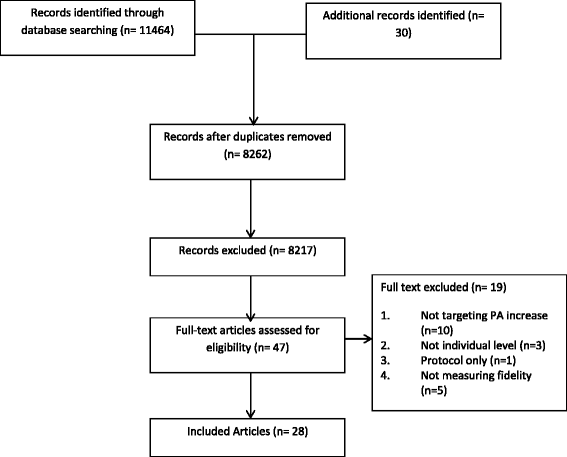Assessment of fidelity in individual level behaviour change interventions promoting physical activity among adults: a systematic review
- PMID: 28969669
- PMCID: PMC5625828
- DOI: 10.1186/s12889-017-4778-6
Assessment of fidelity in individual level behaviour change interventions promoting physical activity among adults: a systematic review
Abstract
Background: Behaviour change interventions that promote physical activity have major implications for health and well-being. Measuring intervention fidelity is crucial in determining the extent to which an intervention is delivered as intended, therefore increasing scientific confidence about effectiveness. However, we lack a clear overview of how well intervention fidelity is typically assessed in physical activity trials.
Methods: A systematic literature search was conducted to identify peer - reviewed physical activity promotion trials that explicitly measured intervention fidelity. Methods used to assess intervention fidelity were categorised, narratively synthesised and critiqued using assessment criteria from NIH Behaviour Change Consortium (BCC) Treatment Fidelity Framework (design, training, delivery, receipt and enactment).
Results: Twenty eight articles reporting of twenty one studies used a wide variety of approaches to measure intervention fidelity. Delivery was the most common domain of intervention fidelity measured. Approaches used to measure fidelity across all domains varied from researcher coding of observational data (using checklists or scales) to participant self-report measures. There was considerable heterogeneity of methodological approaches to data collection with respect to instruments used, attention to psychometric properties, rater-selection, observational method and sampling strategies.
Conclusions: In the field of physical activity interventions, fidelity measurement is highly heterogeneous both conceptually and methodologically. Clearer articulation of the core domains of intervention fidelity, along with appropriate measurement approaches for each domain are needed to improve the methodological quality of fidelity assessment in physical activity interventions. Recommendations are provided on how this situation can be improved.
Keywords: Adults; Behaviour change; Behavioural intervention; Fidelity; Physical activity; Systematic review.
Conflict of interest statement
Ethics approval and consent to participate
Not applicable.
Consent for publication
Not applicable.
Competing interests
The authors declare that they have no competing interests.
Publisher’s Note
Springer Nature remains neutral with regard to jurisdictional claims in published maps and institutional affiliations.
Figures
Similar articles
-
Interventions for promoting habitual exercise in people living with and beyond cancer.Cochrane Database Syst Rev. 2018 Sep 19;9(9):CD010192. doi: 10.1002/14651858.CD010192.pub3. Cochrane Database Syst Rev. 2018. PMID: 30229557 Free PMC article.
-
Physical activity and exercise for chronic pain in adults: an overview of Cochrane Reviews.Cochrane Database Syst Rev. 2017 Apr 24;4(4):CD011279. doi: 10.1002/14651858.CD011279.pub3. Cochrane Database Syst Rev. 2017. PMID: 28436583 Free PMC article.
-
Physical activity and exercise for chronic pain in adults: an overview of Cochrane Reviews.Cochrane Database Syst Rev. 2017 Jan 14;1(1):CD011279. doi: 10.1002/14651858.CD011279.pub2. Cochrane Database Syst Rev. 2017. Update in: Cochrane Database Syst Rev. 2017 Apr 24;4:CD011279. doi: 10.1002/14651858.CD011279.pub3. PMID: 28087891 Free PMC article. Updated.
-
Feasibility study of Learning Together for Mental Health: fidelity, reach and acceptability of a whole-school intervention aiming to promote health and wellbeing in secondary schools.Public Health Res (Southampt). 2025 Jun 18:1-36. doi: 10.3310/RTRT0202. Online ahead of print. Public Health Res (Southampt). 2025. PMID: 40542530
-
Exercise interventions and patient beliefs for people with hip, knee or hip and knee osteoarthritis: a mixed methods review.Cochrane Database Syst Rev. 2018 Apr 17;4(4):CD010842. doi: 10.1002/14651858.CD010842.pub2. Cochrane Database Syst Rev. 2018. PMID: 29664187 Free PMC article.
Cited by
-
Rationale and study design of the MyHEART study: A young adult hypertension self-management randomized controlled trial.Contemp Clin Trials. 2019 Mar;78:88-100. doi: 10.1016/j.cct.2019.01.010. Epub 2019 Jan 21. Contemp Clin Trials. 2019. PMID: 30677485 Free PMC article.
-
Effectiveness of pain neuroscience education, motivational interviewing and cognition targeted exercise therapy in patients with chronic neck pain: protocol for a multicentre randomised controlled trial (the COGMO-AP study).BMJ Open. 2025 Feb 20;15(2):e087788. doi: 10.1136/bmjopen-2024-087788. BMJ Open. 2025. PMID: 39979041 Free PMC article.
-
Focusing on fidelity: narrative review and recommendations for improving intervention fidelity within trials of health behaviour change interventions.Health Psychol Behav Med. 2020 Mar 12;8(1):132-151. doi: 10.1080/21642850.2020.1738935. Health Psychol Behav Med. 2020. PMID: 34040865 Free PMC article. Review.
-
Internet-Administered Cognitive Behavioral Therapy for Common Mental Health Difficulties in Parents of Children Treated for Cancer: Intervention Development and Description Study.JMIR Form Res. 2021 Jul 22;5(7):e22709. doi: 10.2196/22709. JMIR Form Res. 2021. PMID: 34142662 Free PMC article.
-
Improving uptake and completion of pulmonary rehabilitation in COPD with lay health workers: feasibility of a clinical trial.Int J Chron Obstruct Pulmon Dis. 2019 Mar 12;14:631-643. doi: 10.2147/COPD.S188731. eCollection 2019. Int J Chron Obstruct Pulmon Dis. 2019. PMID: 30880952 Free PMC article. Clinical Trial.
References
-
- World Health Organization [WHO]. Physical Activity. 2014; Available from: http://www.who.int/topics/physical_activity/en/
-
- Department of Health. UK physical activity guidlines [Internet]. 2011. Available from: https://www.gov.uk/government/publications/uk-physical-activity-guidelines
Publication types
MeSH terms
LinkOut - more resources
Full Text Sources
Other Literature Sources
Medical
Molecular Biology Databases


